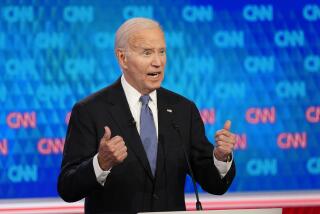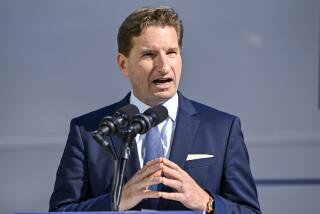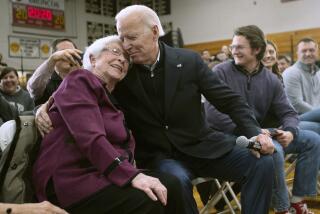GOP Campaign Trail Risks Becoming Path to Defeat
- Share via
WASHINGTON — President Clinton did not design the campaign for the 1996 Republican nomination. But had he done so, he could not have done a better job for himself, or a more effective job of undermining his GOP opposition.
What has happened at the surface of the campaign is bad enough in the eyes of Republican strategists: The party’s presumed front-runner, Sen. Bob Dole, endured repeated humiliations during the past week--several polls showing him slipping behind millionaire magazine publisher Steve Forbes in early primary states, a minor but embarrassing loss to both Patrick J. Buchanan and Forbes in Alaska’s lightly attended GOP caucuses and a steady drumbeat of rivals and party insiders questioning if he is capable of beating Clinton in November.
Beneath the surface, however, the Republicans now face two more serious problems, party insiders say. First, party chasms that had been papered over so long as Dole was a seemingly invincible front-runner are now coming to the surface as party officials, for the first time in months, seriously contemplate the possibility of his losing the nomination.
A second problem is that with sharp-edged television advertisements flooding the airwaves in early primary states, the entire field increasingly is sinking into a swamp of negativism, running the risk of alienating voters.
“It’s everything that voters tell us they hate about politics and politicians,” said Dick Bennett, head of American Research Group, an independent polling firm in New Hampshire.
One of the major divisions within the party surfaced last week when Rep. Dick Armey of Texas, the second-ranking Republican in the House, lashed out at Dole for his criticism of Forbes’ proposals to replace the federal income tax with a 17% flat tax.
Campaigning in New Hampshire, Dole likened Forbes’ plan to “snake oil.” Armey, who has sponsored a flat-tax plan of his own, shot back with a heated statement:
“In politics, panicky candidates sometimes say things they never live down,” he said. “In 1980, George Bush mischaracterized [Ronald] Reagan’s policies as ‘voodoo economics,’ and it haunted him for the rest of his career. It sounds like Bob Dole may be repeating George Bush’s mistake. I hope not. The flat tax is the future of the Republican Party.”
To many analysts, the irony of the GOP’s nomination difficulties was striking. “You couldn’t find a better time to be a Republican,” said Everett Carll Ladd, director of the Roper Research Center, noting the anti-big-government mood of the electorate. “And yet you look at their field of candidates, and nobody has caught on.”
As for the impact of negative advertising, Dole’s aides in recent days have pointed hopefully to poll figures indicating that the percentage of voters with a negative view of Forbes has increased. Unfortunately for them, the same is true of the percentage viewing Dole negatively. Indeed, while recent polls in New Hampshire and Iowa--the states with the most closely watched early primary contests--differ about who is in front, they all report that primary voters are increasingly unhappy with the entire GOP field.
Thus in New Hampshire, Bennett reports, the number of voters who said they would never vote for Forbes has climbed to 37%, from only 23% at the start of last month. The figure for those who say they would never vote for Dole has jumped to 36%, from 11%. Meanwhile, for Buchanan the “never vote for” number has climbed to 49%, from 44%; for Gramm to 36%, from 32%, and for former Tennessee Gov. Lamar Alexander to 27%, from 16%.
Those numbers point up the danger perceived by GOP operatives that by the end of the campaign for the party’s nomination, voters will remember little about any of its candidates but the content of the attack ads that have come to dominate the campaign.
“They [the Republicans] have lost the high ground,” said Hugh Winebrenner, Drake University analyst of the Iowa political scene and author of a book on the Iowa caucuses, which on Feb. 12 will mark the first full-scale struggle for delegates among the 1996 contenders. “If they were going to convince the people of Iowa and the people of America that Bill Clinton is an unethical person they couldn’t trust or put their faith in, they have damaged their own cause by the way they ripped into each other.”
Dole’s advisors shrug off the negativism of the campaign as an inevitable consequence of the intensity of this high-stakes competition. “The nomination is something worth having,” said David Carney, the Kansas senator’s senior strategist in New Hampshire.
But in the meantime, Clinton, who is the first Democrat since Franklin D. Roosevelt to run for reelection without serious primary opposition, has the luxury of spending the next several months--and an enormous campaign war chest--burnishing the image of his administration, a task he began this weekend with a visit to New Hampshire.
To a degree, analysts say, the current difficulties besetting the Republican presidential campaign are rooted in the party’s great success in the 1994 midterm elections, when it seized control of both houses of Congress for the first time in nearly half a century. This shift of power caused a restless electorate to expect a vision of the country’s future that none of the GOP presidential prospects have yet come close to developing.
Complicating the problem was the 1996 campaign calendar, which because of its accelerated schedule of delegate contests in the various states made the ability to raise vast sums of money a requisite for gaining the nomination. This hurdle contributed to the decision of several prominent figures not to enter the race, notably former Housing and Urban Development Secretary Jack Kemp, former Defense Secretary Dick Cheney and former Education Secretary William J. Bennett, all of whom were thought to possess the stature and intellect needed for inspiring leadership.
*
In their absence the 72-year-old Dole, making his third try for the nomination, emerged as the early front-runner, relying heavily on his experience and the prestige of his position as Senate majority leader. But Dole’s failure to provide any more convincing justification for supporting his candidacy than the inevitability of its own success left a vacuum among voters yearning for imaginative leadership into which Forbes rushed, equipped with a multimillion-dollar checkbook.
Forbes’ message of opportunity and growth, built around his flat-tax proposal and his identity as a political outsider, clearly has appeal, a fact noted this past week by no less a figure than House Speaker Newt Gingrich (R-Ga.), who praised Forbes as “a genuine risk-taker” and chided those who believe that Forbes can’t win because “he’s not uniquely qualified to be an insider.”
Nevertheless, many Republicans resent the publisher’s use of his personal wealth to advance his candidacy. “He swats you with the checkbook every time you turn around,” said Tom Rath, an advisor to Alexander and a longtime Republican strategist in New Hampshire. “If Steve Forbes had exactly the same message and played at exactly the same rules as the rest of us he’d be at 2% in the polls.”
As an example of the advantages wealth brings, Rath notes that the Forbes campaign has produced 33 separate commercials it can choose to run in New Hampshire, while the Alexander campaign has only four.
Moreover, Forbes critics say he could be hurting his party and himself in the long run with his ceaseless televised attacks on Dole and the others. And they fret that because he is untested in politics and government, and much about his background is unknown, his gaining the nomination might produce a backlash against the GOP if damaging information comes to light.
“If he were to vanquish the front-runner and become the new front-runner, I think he’d get picked to death,” said one veteran consultant. One particular cause for concern: Forbes’ continuing refusal to make public his income tax returns without any explanation except that they would constitute “a distraction.”
Still another potential difficulty down the road is that Forbes, given his great wealth, would be hard to force out of the race even if he is defeated in some major tests. “He has got the ability to sustain losses,” said Roger Stone, who was chairman of Pennsylvania Sen. Arlen Specter’s now inactive presidential campaign. “He’s got the resources to get beat every Tuesday and come back the following Tuesday.”
For the time being, even if his front-runner status is shaky, Dole remains the favorite in the view of most professionals. And last week he sought to put the best face on matters, remaining calm in the face of adversity.
“I think that he, unlike some people, knew this [nomination] would not happen without a fight,” said consultant Don Sipple, a former advisor to California Gov. Pete Wilson’s campaign, newly signed on by the Dole campaign to help refine the senator’s message. “The only surprise is with whom the fight is.”
*
“We’re not going to mention our opponents,” Dole told reporters as he campaigned in New Hampshire. “We’re going to go out and sell demonstrated leadership. That’s what this race is about.”
And Dole aides insisted that they had gotten the message about the dangers they face and were prepared to do what is needed to right their candidacy. “Dole is not going to increase his favorability or increase his support unless he has a positive message out there to give a rationale for his candidacy,” conceded one well-placed Dole advisor.
But after nearly a year of campaigning, the aide conceded, Dole has yet to accomplish that task. “That’s going to happen next week” he said.
More to Read
Get the L.A. Times Politics newsletter
Deeply reported insights into legislation, politics and policy from Sacramento, Washington and beyond. In your inbox twice per week.
You may occasionally receive promotional content from the Los Angeles Times.









